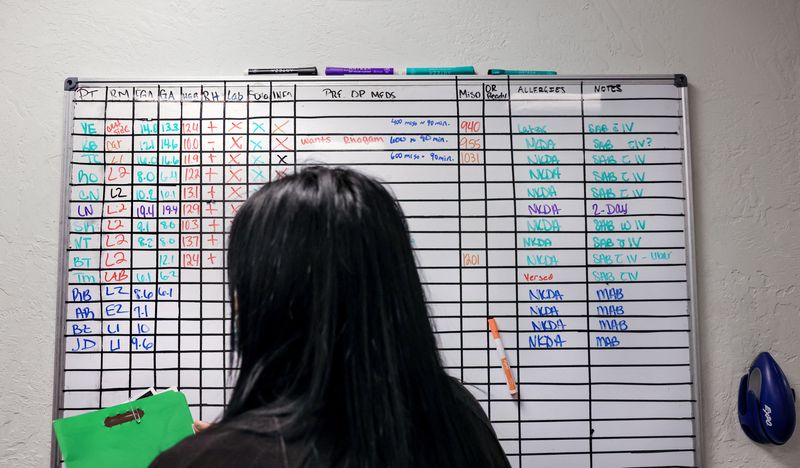
© Reuters. FILE PHOTO: A patient care coordinator checks the day’s schedule of abortions at Trust Women clinic in Oklahoma City, Oklahoma, U.S., December 6, 2021. Picture taken December 6, 2021. REUTERS/Evelyn Hockstein
By Gabriella Borter
(Reuters) – This spring, the U.S. Supreme Court is expected to roll back constitutional protections for abortion that have been in place since the 1973 Roe v. Wade landmark ruling.
Conservative states are swiftly passing abortion restrictions in anticipation of the court’s decision, while liberal states are seeking to protect and expand abortion rights. Here are some bills gaining traction this year:
ABORTION RESTRICTIONS
ARIZONA: Republican Governor Doug Ducey in March signed a bill banning abortions after 15 weeks of pregnancy. The measure makes exceptions for medical emergencies, but not for rape or incest. It will take effect in late summer if not blocked in court.
FLORIDA: The legislature in March passed a 15-week abortion ban, which allows exceptions for medical emergencies or if the fetus has a fatal abnormality. It awaits the signature of Governor Ron DeSantis, a Republican, who has signaled support for the bill.
IDAHO: Republican Governor Brad Little signed a six-week abortion ban in March that allows family members of the fetus to sue providers who perform abortions past that point, similar to a Texas law enacted last year. The Idaho law is due to take effect in late April if not blocked in court.
KENTUCKY: The legislature has passed several abortion restrictions, including a 15-week ban, a requirement that fetal remains be cremated or interred, and a requirement that a combination birth-death or stillbirth certificate be issued for each abortion. Democratic Governor Andy Beshear has vetoed the bill, but the senate’s Republican supermajority could still override his veto until April 14.
OKLAHOMA: Republican Governor Kevin Stitt on Tuesday signed a bill banning abortion except in medical emergencies and penalizing providers who violate the law with up to $100,000 in fines and 10 years in prison. The law is due to take effect over the summer if not blocked in court.
The House also approved a bill in March that would ban all abortions except in cases of medical emergency, rape or incest. It would rely on private citizens to sue providers and any person who “aids or abets” abortions to be enforced, similar to Texas’ six-week ban. The Senate is considering the legislation.
SOUTH DAKOTA: Republican Governor Kristi Noem signed a bill in March requiring women to make three in-person doctor’s visits to complete a medication abortion. The legislation’s implementation depends on the outcome of a federal court case.
ABORTION PROTECTIONS
COLORADO: Governor Jared Polis, a Democrat, signed a bill this month codifying the right to have an abortion. The measure immediately took effect.
MARYLAND: The legislature passed a bill that expands the definition of who can provide abortions to any “qualified provider,” establishes a state-funded abortion provider training program and requires most insurance plans to cover the cost of abortions. Republican Governor Larry Hogan vetoed the bill, but the state’s Democratic-controlled legislature overrode his veto this month and the law is due to take effect July 1.
VERMONT: The Democratic-led legislature in February passed a constitutional amendment that guarantees the right to abortion. It will be on the ballot for voters to approve in November.
Stay connected with us on social media platform for instant update click here to join our Twitter, & Facebook
We are now on Telegram. Click here to join our channel (@TechiUpdate) and stay updated with the latest Technology headlines.
For all the latest Business News Click Here
For the latest news and updates, follow us on Google News.
